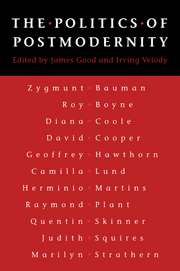Book contents
- Frontmatter
- Contents
- Acknowledgements
- Notes on contributors
- 1 Introduction: postmodernity and the political
- Part I Modernity and its vicissitudes
- Part II The critique of modernist political thought
- 6 Antinomies of modernist political thought: reasoning, context and community
- 7 Master narratives and feminist subversions
- 8 In different voices: deliberative democracy and aestheticist politics
- Part III Technology and the politics of culture
- Index
6 - Antinomies of modernist political thought: reasoning, context and community
Published online by Cambridge University Press: 05 June 2012
- Frontmatter
- Contents
- Acknowledgements
- Notes on contributors
- 1 Introduction: postmodernity and the political
- Part I Modernity and its vicissitudes
- Part II The critique of modernist political thought
- 6 Antinomies of modernist political thought: reasoning, context and community
- 7 Master narratives and feminist subversions
- 8 In different voices: deliberative democracy and aestheticist politics
- Part III Technology and the politics of culture
- Index
Summary
…we are here as on a darkling plain
Swept with confused alarms of struggle and flight,
Where ignorant armies clash by night.
Matthew Arnold, ‘Dover Beach’At the foundation of well-founded belief lies belief that is not founded.
Wittgenstein, On CertaintyThat a society needs some kind of moral foundation, a set of beliefs which either do or might hold it together, is a general assumption of political philosophy. Indeed many political theorists have held the view that some kind of transcendental sanction is necessary for morality and for moral and political ties. Locke, for example, argued in his Letter on Toleration that: ‘Promises, covenants and oaths, which are the bond of human society, can have no hold or sanctity for the atheist, for the taking away of God, even if only in thought, dissolves all.’
On the other hand, if morality is subjective then we need a set of principles which will provide a foundation for political accommodation between subjective standpoints. This idea has its roots in Plato in his critique of the Sophists who argued that man is the measure of all things, of what is true and what is false, of what is right and what is wrong. On this view politics was turned into a criterionless matter of persuasion and rhetoric rather than truth and rightness. With Plato's assumption that there is a clear distinction to be drawn between knowledge and belief he argued that the claim to authority of the ruler must be based upon his claim to possess such knowledge.
- Type
- Chapter
- Information
- The Politics of Postmodernity , pp. 76 - 106Publisher: Cambridge University PressPrint publication year: 1998
- 2
- Cited by

